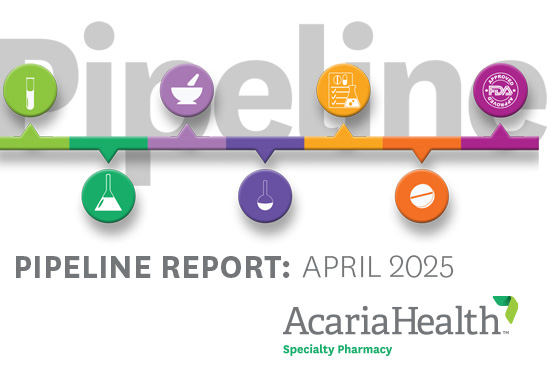Pipeline Report
New AcariaHealth Pipeline Report - April 2025
04/30/2025

During the last quarter the FDA approved the first ever encapsulated cell therapy – ENCELTO (revakinagene taroretcel-lwey) – containing cells genetically modified to produce ciliary neurotrophic factor (CNTF) for the treatment of adults with macular telangiectasia type 2 (MacTel), an ophthalmic condition occurring primarily in older adults that can lead to vision loss. Encelto is the first FDA-approved therapy for this relatively rare disease. The FDA also approved ZEVASKYN (prademagene zamikeracel) gene-corrected epidermal sheets for the treatment of epidermolysis bullosa, targeting the population of patients with larger disease-affected areas who may not be candidates for therapy with the existing topical gene therapy alternative, VYJUVEK. And finally, the FDA also approved a new therapy for hemophilia which is another rare disease, but one that already has multiple therapeutic alternatives available. Those existing alternatives, however, are usually only FDA-approved for either hemophilia A or hemophilia B and some are approved for use in patients either with inhibitors or without. QFITLIA (fitusiran) is the new agent that was approved for all scenarios – hemophilia A or B, with or without inhibitors. QFITLIA offers every-other-month subcutaneous dosing, representing a patient convenience advantage over other therapies.
Some key pipeline highlights to watch for in the upcoming quarters include an expected FDA decision for CAP-1002 (deramiocel) cell therapy for Duchenne muscular dystrophy (DMD)-associated cardiomyopathy. This would be the first cell-based therapy for DMD and the first therapy to target patients who are in the advanced stages of the disease, an area with few other treatment alternatives. And finally, the intrathecal formulation of ZOLGENSMA (onasemnogene abeparvovec-xioi) is expected to be headed to the FDA soon for the treatment of spinal muscular atrophy (SMA), with a potential approval by the end of the year. The intended treatment population includes pediatric SMA patients from two to 18 years of age, a population for which the existing intravenous formulation of ZOLGENSMA is not indicated. If approved, intrathecal ZOLGENSMA would greatly expand the number of SMA patients eligible for gene therapy.
Alan R. Smith, MD
Vice President, Medical Director
Our quarterly publication is developed by our Clinical Pharmacy Drug Information team to provide additional drug pipeline information and insights to help health care leaders prepare for shifts in prescription drug management. Learn more by accessing the complete AcariaHealth April 2025 Pipeline Report (PDF).
